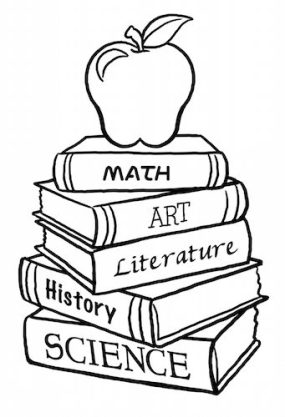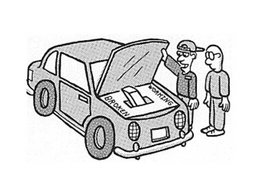 When kids reach high school they start to suspect that much of what they are learning in school is useless. I’m here to agree with that statement, and to offer some simple takeaways on the core subjects.
When kids reach high school they start to suspect that much of what they are learning in school is useless. I’m here to agree with that statement, and to offer some simple takeaways on the core subjects.
Math
While studying trigonometry a million years ago I started to think of math as exercises for my brain. I could actually feel muscles in my cranium getting stronger as I made sine and cosine and other funny little squiggly things equate to something that made sense. I thought of them as a foreign language or a secret code. If I cracked the code, I could reduce everything down to the right number and do well on the exam. I must have been okay at it since I got As, but damned if it seemed to have any practical purpose!
Then there was calculus, when everything went off the rails. When the calculus teacher described his beloved subject as “shooting a mouse with an elephant gun” I was out.
Takeaway: Fractions. That’s all you need to remember. When your teachers tell you how important it is to learn fractions – don’t underestimate the seriousness of this statement! If I had a dollar for every time I figured out something using “this over that equals this other thing over what” and cross multiplying, I would be rich. But the rest of it? Pretty much shooting a mouse with an elephant gun.
Language Arts
Do they even call it that anymore? Seemed like a fancy way to say you were teaching English to native English speakers. In high school, it meant reading the “classics.” But forcing kids to read something in order to get something specific out of it seems counterproductive. I’m sure I’m not the only one who felt this way. Otherwise, why would Cliffs Notes exist?
Sometime in the last millennium, teachers must have figured this out. My teens haven’t read the classics, but they are still forced to read. Learn new words. Write and construct proper sentences. All good things. But to what end? With Spell Check and his evil twin Autocorrect, knowing how to spell really isn’t all that necessary … or even helpful.
Takeway: Read. Something. Anything. It doesn’t matter what. Even if it’s just the titles on YouTube videos. But know this… Just like “you are what you eat,” “you are what you read” is also true. You can live on a diet of soda and candy, but you’re going to feel and look like crap. If you read nothing but the directions on the back of your microwaveable mac n cheese container, you better think twice before trying to impress your crush with an eloquent text message.
Science
For those of you still pondering my statement about muscles in my cranium, I’m right there with you. Biology. Yuck. I didn’t want to cut up anything, so I skipped this essential science. In general, I don’t think I’m any dumber for it, and I was spared the trauma of formaldehyde frogs.
I actually loved chemistry. There was something about the periodic table, the order of the elements, common properties, how matter could exist in different states… solid, gas, liquid, and (wait what?) plasma. That was fun. Do I still use it? Hell no.
Takeway: The scientific fact that sticks with me the most I learned in physics: If the earth suddenly stopped rotating, everything that wasn’t rooted to the planet or had something impeding its path would end up six miles to the east. Mind. Blown.
Foreign Language
After five years of French all I really remember these days are simple sentences… “Je joue le tennis” (I play tennis) / “Ou est la bibliotheque?” (Where is the library?). If I find myself in Paris someday I can string together this incredibly useful information. Parisians will hand me a tennis racket and point me to the nearest library.
Takeaway: The one phrase of whatever foreign language you study that you will remember first and foremost is guaranteed to be the least useful thing you could possibly ever utter. For me, that would be “N’essayez pas sur la chaffeuse!” (Don’t sit on the heater!)
Madame Lee, bless her heart, really did not like it when students sat on the ginormous heater that occupied most of one wall in her classroom. However, because it was warm – and the size of a small car – that’s of course where we all sat. Which is why, today, when someone asks me if I still remember any French, all I can do is implore them to not sit on the heater. (Without even a ‘s’il vous plait’!)
Bonus: If you expose yourself to enough foreign languages, you will also pick up random and questionably useful phrases in a variety of tongues. For example, though I never formally studied Spanish I can successfully tell someone I have a nose (“tango nariz”) and ask the question “cuanta mucha para la puta?” (I’ll let you look that one up.)



 Tomorrow I won’t get a “happy birthday” text from you. People used to ask if you and I were close, and I would joke about how we texted each other once a year, on our birthdays. Then our parents were in that horrible car accident. Texts between us became frequent as we tag-teamed their care in two different hospitals. Insurance information, doctor’s reports, calls to the police station for updates. Eventually mom and dad recovered. You and I went back to annual texts.
Tomorrow I won’t get a “happy birthday” text from you. People used to ask if you and I were close, and I would joke about how we texted each other once a year, on our birthdays. Then our parents were in that horrible car accident. Texts between us became frequent as we tag-teamed their care in two different hospitals. Insurance information, doctor’s reports, calls to the police station for updates. Eventually mom and dad recovered. You and I went back to annual texts.




